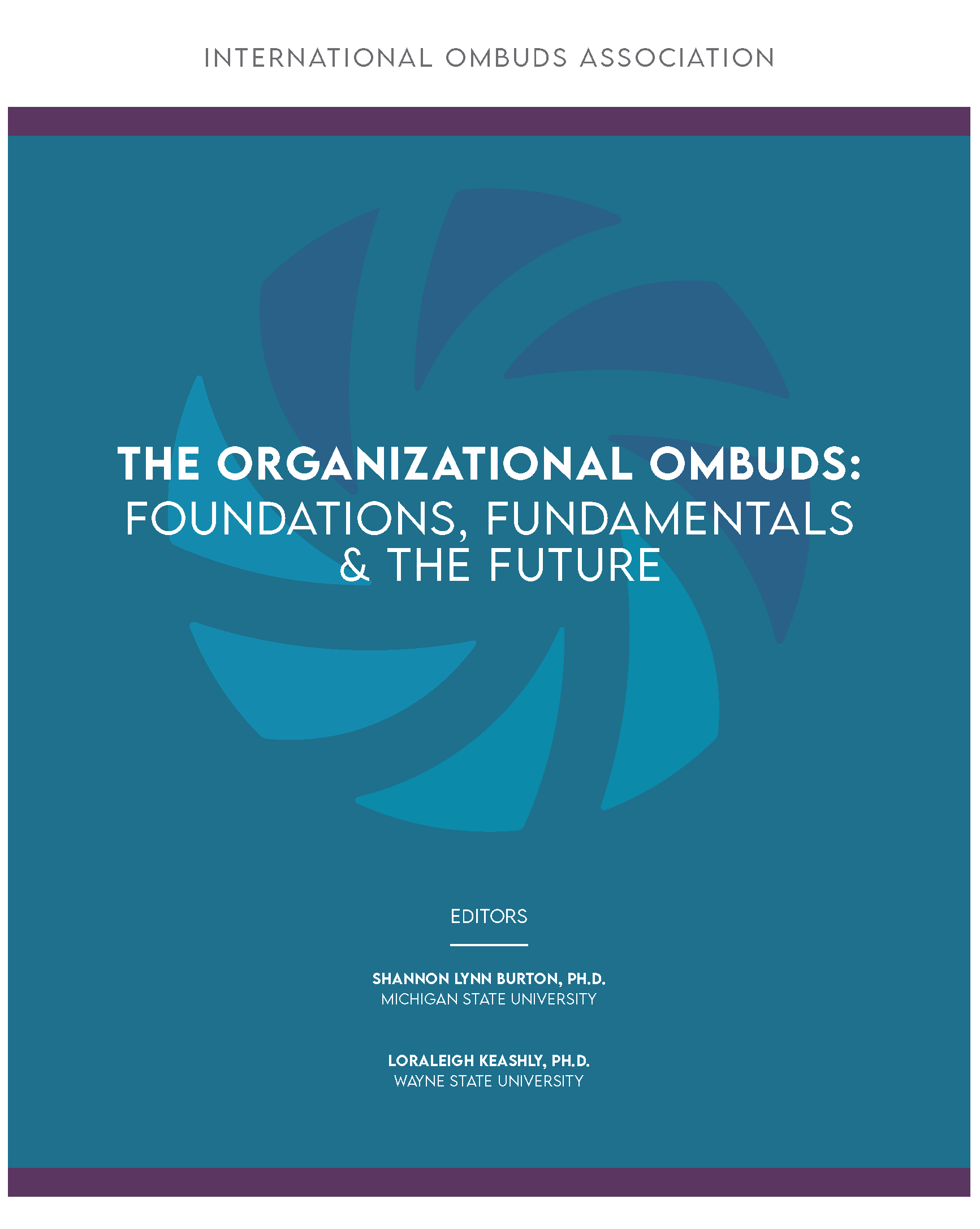Introducing IOA Publishing
IOA has launched a book publishing arm and our first publication is a compilation titled The Organizational Ombuds: Foundations, Fundamentals & The Future.
Release Date: 7 April 2025
The Organizational Ombuds: Foundations, Fundamentals & The Future
Editors:
Shannon Lynn Burton, Ph.D. Michigan State University
Loraleigh Keashly, Ph.D. Wayne State University
Publisher: International Ombuds Association
Organizational Ombuds first appeared in North America in the 1960s as an offshoot of classical ombuds practices rooted in Northern Europe. While there have been many publications that address organizational ombuds practice in the form of articles and journals, as well as publications that serve as legal guides to practice (Howard, 2010), there has yet to be a comprehensive handbook that addresses the interdisciplinary and nuanced history, theory and practices found within the field.
This book provides a holistic look at the work of organizational ombuds, including its historical roots, theoretical approaches in the field, sectors in which it is practiced, its organization and delivery, as well as the future of the field. Those outside of organizational ombuds often relegate it to an alternative dispute resolution function.
However, it is, in fact, a much more diverse practice that stretches organizational structures, communications, human development, systemic problems, and concerns, as well as conflict resolution. To comprehend the whole of organizational ombuds practice, both researchers and practitioners must have a solid footing as to what constitutes the field. This book hopes to provide just that.
Foreword: Organizational Ombuds, a Nascent and Unique Profession
Mary Rowe
Acknowledgments
Introduction
Shannon Lynn Burton and Loraleigh Keashly
Part 1: Foundations
History of Organizational Ombuds Practice
Shannon Lynn Burton and Ryan T. Smith
Ombuds and Theory
Mary Bliss Conger, Bina Patel, and Jacqueline Villafañe
Demonstrating Value Through Effectiveness
Hector Escalante Meza
Ethical Ombudsing: Principled Parameters for Ombuds Decision Making
Linda M. Brothers
Diversity, Equity, Inclusion, and Belonging in the Ombuds Space
D. A. Graham, Brent Epperson, Heather McGhee Peggs, and Julie Boncompain
Legal Issues for Organizational Ombuds Practice
Caroline Adams
Part 2: Ombuds Practice in the Sectors
The Academic Sector
David G. Schwartz, Anna-Katharina Rothwangl, and Jorge A. Ribeiro Pereira
Governmental Ombuds
Emma Phan and Paul Sotoudeh
The Corporate Sector
Kira Nurieli and Ellen Reardon
International, Multilateral, Global, or Cross Organizational: Ombuds Work That Crosses Boundaries
Shannon Lynn Burton
Emerging Sectors in Ombuds Practice
Natalie C. Fleury and Thomas A. Kosakowski
Part 3: Organization and Delivery
Mission, Goals, and Objectives
Don Greenstein and Chinyere Ukabiala
Models of Ombuds Practice
Jennifer Mahony
Organizational Engagement and Relationships
Donna Buehler and Elizabeth Hill
One-to-One Practices in Organizational Ombuds Work
Julia L. Farmer
Group Facilitation in Organizational Ombuds Practice
Teresa Ralicki and Lisa Neale
Systemic Feedback in Organizational Ombuds Practice
Mary Bliss Conger
Ombudsing Virtually
Jared James Keli’ikuikahi Lee and Julie Muroff
Data Management, Analysis, and Trend Tracking
Brett Harris
Model Programs in Organizational Ombuds Training
Esther Eunjin Lin
Part 4: The Future of Organizational Ombuds Practice
Current Issues in Organizational Ombuds Research
Shereen G. Bingham, Shannon Lynn Burton, and Tyler Smith
Meeting the Needs of Tomorrow’s Organizational Ombuds’ Visitors
Darlene Moorman
Anticipating Changes in Organizational Ombuds Practice
Elisa Ortega-Schultz
Conclusion
Shannon Lynn Burton and Loraleigh Keashly
For questions about the book, please reach out to Ellen Miller at [email protected].
A Note about IOA Editorial Purview: As with all affiliated publishers, including university and association presses, books and articles published by IOA have not been reviewed by the IOA Board of Directors and do not reflect the official endorsement or views of the IOA. IOA’s publishing initiative aims to advance research and foster discussion on the Organizational Ombuds model and its application. Similar to the Journal of the International Ombuds Association (JIOA), content is reviewed by the publication’s editorial team and does not necessarily represent the policies or perspectives of the IOA.
Available for special purchase at the 20th Anniversary Conference in Miami for the special launch rate of $89.95. The book will be available for purchase via the IOA website beginning 1 May 2025.
|

